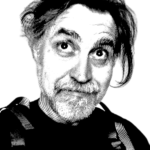Ursula K. Le Guin and The Lathe of Heaven

Local Author Discovers 50 Year-Old Truth-Drop in SF Novel
I first read The Lathe of Heaven, a fine science fiction novel by the inestimable writer and thinker Ursula K. Le Guin, as a curious teenager and fan of such speculative fiction. I read the book after watching a television adaptation which had compelled my imagination, but I’m not sure the novel held quite the same power. Not at the time, anyway.
On a recent reread, however, I found this book filled with not only wisdom, but what some moderns call ‘truth drops.’ Her metaphorical depiction of mass mind control through technology nailed me to the wall.
The machine… Well, I can’t tell you how it works; but anyway, he’s using it on me to keep my brain in the d-state [delta-state], as he calls it—that’s one term for the kind of special sleep you have when you’re dreaming. It’s quite different from ordinary sleep. He sends me to sleep hypnotically, and then turns this machine on so that I start dreaming at once—one doesn’t usually. Or that’s how I understand it. The machine makes sure that I dream, and I think it intensifies the dream-state, too. And then I dream what he’s told me to dream in hypnosis.
Check out the synopsis of the novel: The plot concerns a character whose dreams seem to alter past and present reality, a condition for which he seeks help from a government psychiatrist. The doctor, an idealistic progressive, succumbs to megalomania when he realizes he can manipulate his patient’s dreams to forge the reality he would like to see for the world.
 Example: when the doctor decides he’ll ‘end racism forever,’ the patient wakes up the next day to discover the skin of every human alive transformed into a powdery gray color. Solved! “I have to instill social responsibility in you hypnotically, every time,” Dr. Haber complains with the hubris of manifest destiny, of white-man’s-burden.
Example: when the doctor decides he’ll ‘end racism forever,’ the patient wakes up the next day to discover the skin of every human alive transformed into a powdery gray color. Solved! “I have to instill social responsibility in you hypnotically, every time,” Dr. Haber complains with the hubris of manifest destiny, of white-man’s-burden.
When the author wrote this piece, I suspect ‘the machine’ in her mind was clearly television. The problem she describes, which is that of having a curated worldview courtesy a meta-scripted narrative of language and events, continues today in the narrowly curated echo chambers of social media platforms, as well the older method of hypnotic television programming. Now, what we call ‘news’ is merely corporate messaging often delivered in fascistic collusion with the State, content which compels and informs the thinking of so many older citizens still trapped shivering in a coldly propagandized tub of agitprop, advertising and social engineering.
But, at this point in such discussions we are always left with the question: who, pray tell, is the meta-writer of this rather obvious and pernicious meta-script, often promulgated by literal actors playing scripted roles before ‘news’ cameras?
Is the mysterious and shadowy THEY the hierarchy entraining you? That much we know.
You tell me who the individual perpetrators are, no doubt visionaries like the mad scientist of the novel, using the world and its population of spiritually sovereign souls as their laboratory in pursuit of ‘the Great Work.’ The functionaries on the screens manipulating the dreams of humanity, gums flapping and eyeballs bugging, certainly aren’t smart enough to write the script. They are ‘actors,’ sure, but only in the theatrical sense.
In any case, the manner in which Le Guin’s mad Dr. Haber symbolizes the whole of the scientific technocracy which currently has the world in the grip of its tentacles gives us a clue as to her view of how the modern world works.
One other aspect of the work rings clear and strong: Her knowledge and study of Taoism, with its cautions about ‘cutting one’s hands when using the master’s tools,’ informs both text and subtext throughout this short but vital American novel which more than transcends its genre roots as one of her ‘minor’ works. Reading it as a teenager entertained and stimulated me; revisiting the text forty years later has left me stunned at one writer’s ability to ‘boil down the problem,’ in a philosophical sense, through a piece of entertaining fiction, the reading of which is like entering a dream, a dream which seems to be coming true before my eyes…
Dream a little dream, dream dream dream…

About dmac
James D. McCallister is a South Carolina author of novels, short stories, journalism, creative nonfiction and poetry. His neo-Southern Gothic novel series DIXIANA was released in 2019.